Vintage 1970s Photos Show Lost Sites of NYC's Lower East Side
A quest to find his grandmother's birthplace led Richard Marc Sakols on a mission to capture his changing neighborhood on film.


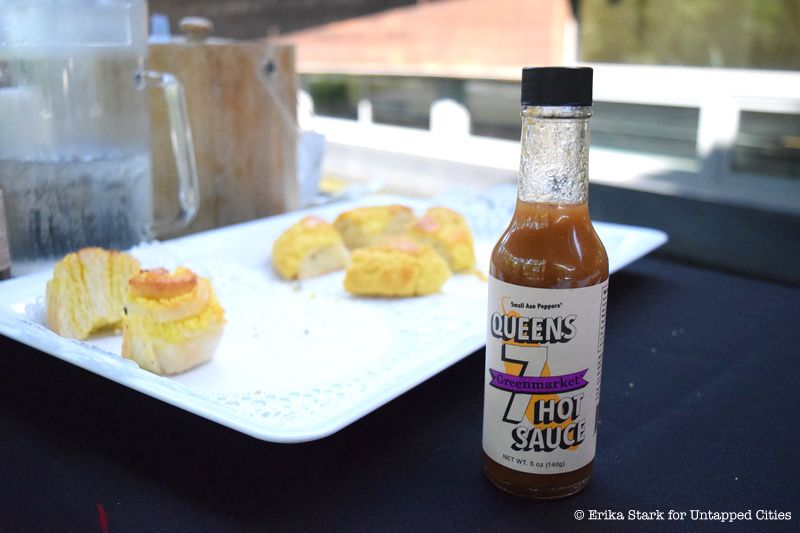
On June 22nd, a spicy new condiment launched to the public: Queens 7 Greenmarket Hot Sauce, a follow up to the popular Bronx Hot Sauce. At the Thursday morning kick-off event, community farmers involved with the project as well as the organizations behind the sauce’s inception — Small Axe Peppers and GrowNYC — met at the Queens Botanical Gardens to celebrate the debut of the sauce and talk a little more about their involvement with the project.
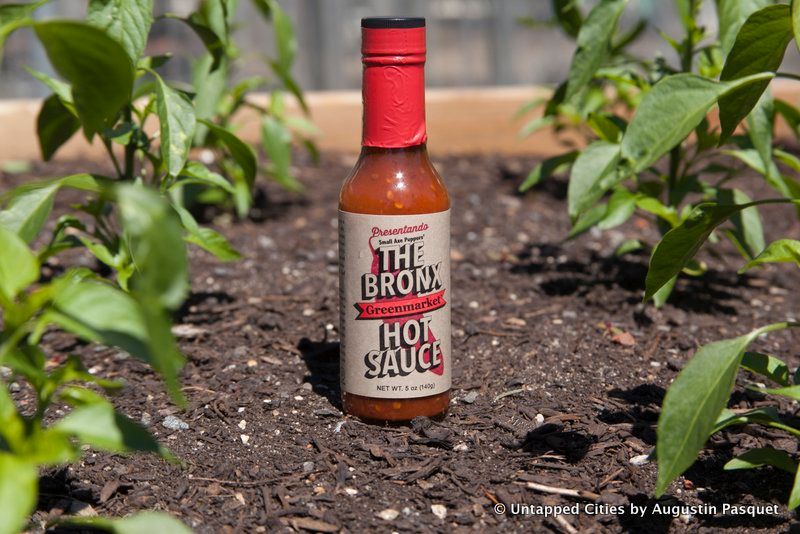
The plan for this hot sauce is two-fold, as it aims to not only show the diversity of Queens, but also to stimulate the local economy by returning the proceeds from the sauce back to the community gardens that produce it. A big part of the confidence in the success of the Queens 7 hot sauce comes from the first time Small Axe Peppers and GrowNYC dabbled in this kind of partnership and community model: The Bronx Hot Sauce.
About three years ago in 2014, the two organizations worked to donate over 3,500 serrano pepper seedlings to community gardens throughout the Bronx in what would ultimately result in 5,000 bottles of the sauce. Since its inception, production of this sauce has increased 14 times, with 70,000 total bottles in 2016.
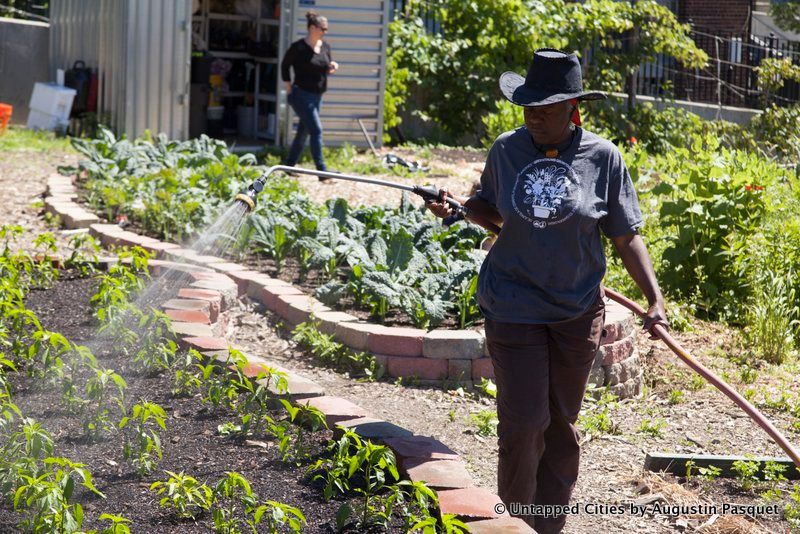
The goal for the Queens 7 Greenmarket Hot Sauce is quite simply to recreate that success, but this time with Queens as the inspiration for the recipe and community gardens in the borough as producers. Chef King Phojanakong, the creative mind behind the recipe for both sauces — who also runs the hidden restaurant, Kuma Inn, located on Ludlow street — says that the initial inspiration for these sauces was focus on flavors that would strive to represent the distinct personalities and cultures of their respective boroughs. For Queens, he says, he decided to focus on Jalapeños (to represent Hispanic culture), tomatoes (showcasing Italian heritage), and fish sauce (traditionally found in Asian cuisine) to illuminate the rich diversity of the borough.
Even the concept of a sauce, Phojankong says, was in itself symbolic for their mission of community unity and involvement. “You don’t want something too spicy or too sweet– you want something well balanced,” he said. “That’s what a good sauce is. Everything in a sauce has to work together.”
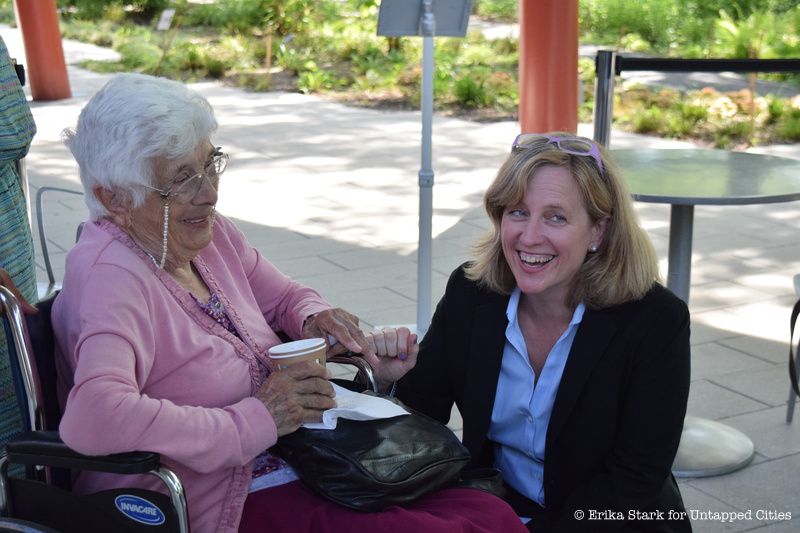
Queens Borough President, Melinda Katz (right) talks with 95-year-old Queens resident, Clara LoSordo (left) about the project. LoSordo says she believes the hot sauce project is an example of the millennial generation finally getting back to the natural-food roots of her childhood, which LoSordo attributes as a being a big part of her longevity.
The other component of the hot sauce has to do with the organizations that are involved in the growing process. Each organization had its own unique story of involvement to tell, but two in particular emphasized something equally as important to them as financial success: education.
For example, 13 women from the Korean American Service Center, a center that promotes the education and assistance of women who are survivors of domestic violence, are using this opportunity to learn real life skills. It’s the hope of Inae Lee, a self sufficiency councilor with the program, that the farming and business education that comes through the hot sauce partnership will help these women beat a statistic Lee shared at the event: that 70 percent of all domestic violence survivors consider their possible diminished socioeconomic status or possible loss of financial stability when deciding whether or not to stay with their abuser. Lee believes giving women the tools to feel economically independent and confident in their skills is key to beating those numbers.
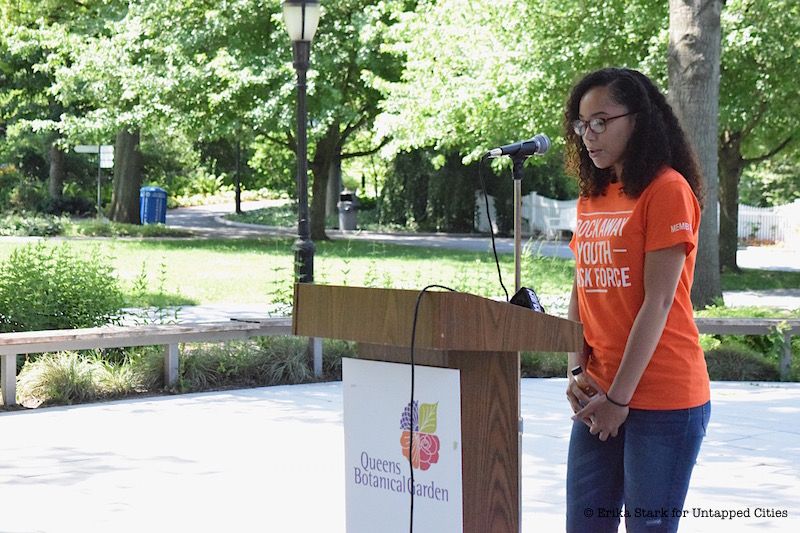
A member of Rockaway Youth Task Force speaks on behalf of her organization at Thursday’s Press Conference.
Similarly-minded is another group participating in the farming process is Rockaway Youth Task Force. Rockaway is a completely youth-led advocacy group (men and women ages 14-25) that arose after the devastating effects of Hurricane Sandy. When Sandy shuttered many local grocery stories, fresh produce was hard to come by, according to the executive director of Rockaway Youth Task Force, Milan Taylor. Now Rockaway is using the Queens 7 sauce as an opportunity to increase the nutrition in their neighborhood as well as teach business skills to their members.
“This is an opportunity for the members of Rockaway to see what it takes to run a business from beginning to end,” Taylor says. “It’s an interesting segue to youth entrepreneurship.”
Queens 7 Hot Sauce is now officially available for pre-order online with expected in-person providers to be Greenmarket farmer’s markets, places like the Chelsea market, and Whole Foods.
Next, check out The Bronx Greenmarket Hot Sauce Supports Low Income Communities in NYC to learn more about the sauce that started it all, or take a look at the First Greenmarket Returns to World Trade Center Since 9/11 at Oculus Plaza. Get in touch with the author: @Erika_A_Stark.
Subscribe to our newsletter